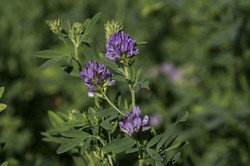Alfalfa sheds its complex secrets
Alfalfa is the world's oldest, most important and most intensively studied fodder crop. This flowering plant species has potential uses in the pharmaceutical, biodegradable plastics, biofuels, textiles and food industries. The EU-funded ALFALFAEVOLUTION (Adaptation and evolution of wild alfalfa: A genomic approach) initiative aimed to disentangle the complex variation patterns of the M. sativa. The researchers employed new population genomics in efforts to understand complex processes such as population divergences, migration and hybridisation of alfalfa. The team started by investigating the genetic variation of M. sativa so as to characterise discrete wild populations of this economically important plant species. They then explored the relationships among the distinct M. sativa populations. ALFALFAEVOLUTION investigated the geographical origins of specific M. sativa species and what drives these species to spread. The researchers studied gene flow to explore the mechanisms of ecological adaptation of wild alfalfa populations. They found that M. sativa forms three main clusters: subspecies caerulea, subspecies falcate and subspecies xvaria. ALFALFAEVOLUTION showed that the M. sativa species is less differentiated than previously thought and that it originated in central Asia. The researchers showed that M. sativa is a naturally occurring species together with its relatives, and that the M. hybrida is its closest relative. ALFALFAEVOLUTION has generated a gene tree of M. sativa and its relatives, but this shows extensive hybridisation among the relatives. The researchers planned to conduct further analyses to find specific hybridisation events that occurred in this group. Project results will establish a basis for future successful breeding strategies of alfalfa cultivars. Alfalfa breeders will be able to use this information to increase survival of cultivars or to design breeding programs in the context of climate change.







